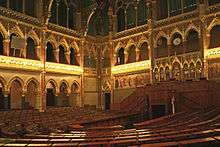Gyula Kállai
Gyula Kállai (Hungarian: [ˈɟulɒ ˈkaːllɒi]; 1 June 1910 – 12 March 1996) was a Hungarian Communist politician who served as Chairman of the Council of Ministers of the People's Republic of Hungary from 1965 to 1967 and as Speaker of the National Assembly of Hungary 1967–1971. He was President of National Council of the Patriotic People's Front from 1957 to 1989.
Gyula Kállai | |
|---|---|
 | |
| Chairman of the Council of Ministers of the People's Republic of Hungary | |
| In office 30 June 1965 – 14 April 1967 | |
| Preceded by | János Kádár |
| Succeeded by | Jenő Fock |
| Personal details | |
| Born | 1 June 1910 Berettyóújfalu, Austria-Hungary |
| Died | 12 March 1996 (aged 85) Budapest, Hungary |
| Nationality | Hungarian |
| Political party | Hungarian Communist Party, Hungarian Working People's Party, Hungarian Socialist Workers' Party |
| Spouse(s) | Anna Kárpáti (1st) ? Berkes(2nd) |
| Children | Judit Zsuzsa |
In 1957, Kállai visited and questioned Imre Nagy, the former Hungarian prime minister, in exile in Snagov, Romania. His report led to his ultimate execution.[1] That same year he wrote a pamphlet titled The Hungarian Counter-Revolution in the Light of Marxism-Leninism.
References
- Nagy, Imre (2006). Snagovi jegyzetek: gondolatok, emlékezések, 1956-1957. Gondolat. ISBN 9639610550.
External links
| Political offices | ||
|---|---|---|
| Preceded by László Rajk |
Minister of Foreign Affairs 1949–1951 |
Succeeded by Károly Kiss |
| Preceded by Albert Kónya |
Minister of Education 1957–1958 |
Succeeded by Valéria Benke |
| Preceded by János Kádár |
Prime Minister of Hungary 1965–1967 |
Succeeded by Jenő Fock |
| Preceded by Erzsébet Metzker Vass |
Speaker of the National Assembly 1967–1971 |
Succeeded by Antal Apró |
This article is issued from Wikipedia. The text is licensed under Creative Commons - Attribution - Sharealike. Additional terms may apply for the media files.

